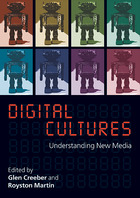Glen Creeber, Royston Martin (eds.): Digital Cultures: Understanding New Media (2008)
Filed under book | Tags: · digital cinema, digital divide, facebook, internet, mass media, media studies 2.0, new media, public broadcasting, public sphere, video games, wikipedia, youtube

From Facebook to the iPhone, from YouTube to Wikipedia, from Grand Theft Auto to Second Life – this book explores new media?s most important issues and debates in an accessible and engaging text for newcomers to the field.
With technological change continuing to unfold at an incredible rate, Digital Cultures rounds-up major events in the media?s recent past to help develop a clear understanding of the theoretical and practical debates that surround this emerging discipline. It addresses issues such as:
* What is new media?
* How is new media changing our lives?
* Is new media having a positive or negative effect on culture and human communication?
Each chapter contains case studies which provide an interesting and lively balance between the well-trodden and the newly emerging themes in the field.
Topics covered include digital television, digital cinema, gaming, digital democracy, mobile phones, the World Wide Web, digital news, online social networking, music and multimedia, virtual communities and the digital divide.
Digital Cultures is an essential introductory guide for all media and communication studies students, as well as those with a general interest in new media and its impact on the world around us.
Publisher Open University Press, 2008
ISBN 0335221971, 9780335221974
Length 205 pages
Mark Warschauer: Technology and Social Inclusion. Rethinking the Digital Divide (2004)
Filed under book | Tags: · community, digital divide, internet, virtual communities

Much of the discussion about new technologies and social equality has focused on the oversimplified notion of a “digital divide.” Technology and Social Inclusion moves beyond the limited view of haves and have-nots to analyze the different forms of access to information and communication technologies. Drawing on theory from political science, economics, sociology, psychology, communications, education, and linguistics, the book examines the ways in which differing access to technology contributes to social and economic stratification or inclusion. The book takes a global perspective, presenting case studies from developed and developing countries, including Brazil, China, Egypt, India, and the United States.
A central premise is that, in today’s society, the ability to access, adapt, and create knowledge using information and communication technologies is critical to social inclusion. This focus on social inclusion shifts the discussion of the “digital divide” from gaps to be overcome by providing equipment to social development challenges to be addressed through the effective integration of technology into communities, institutions, and societies. What is most important is not so much the physical availability of computers and the Internet but rather people’s ability to make use of those technologies to engage in meaningful social practices.
Publisher MIT Press, 2004
ISBN 0262731738, 9780262731737
Length 260 pages
More info (publisher)
More info (google books)
Jack Linchuan Qiu: Working-Class Network Society: Communication Technology and the Information Have-Less in Urban China (2009)
Filed under book | Tags: · china, communication technology, digital divide, network society

“The idea of the “digital divide,” the great social division between information haves and have-nots, has dominated policy debates and scholarly analysis since the 1990s. In Working-Class Network Society, Jack Linchuan Qiu describes a more complex social and technological reality in a newly mobile, urbanizing China. Qiu argues that as inexpensive Internet and mobile phone services become available and are closely integrated with the everyday work and life of low-income communities, they provide a critical seedbed for the emergence of a new working class of “network labor” crucial to China’s economic boom. Between the haves and have-nots, writes Qiu, are the information “have-less”: migrants, laid-off workers, micro-entrepreneurs, retirees, youth, and others, increasingly connected by cybercafés, prepaid service, and used mobile phones. A process of class formation has begun that has important implications for working-class network society in China and beyond.
Qiu brings class back into the scholarly discussion, not as a secondary factor but as an essential dimension in our understanding of communication technology as it is shaped in the vast, industrializing society of China. Basing his analysis on his more than five years of empirical research conducted in twenty cities, Qiu examines technology and class, networked connectivity and public policy, in the context of massive urban reforms that affect the new working class disproportionately. The transformation of Chinese society, writes Qiu, is emblematic of the new technosocial reality emerging in much of the Global South.”
Foreword by Manuel Castells
Afterword by Carolyn Cartier
Publisher MIT Press, 2009
Information Revolution and Global Politics series
ISBN 026217006X, 9780262170062
320 pages
PDF (added on 2013-6-21)
Comments (2)
